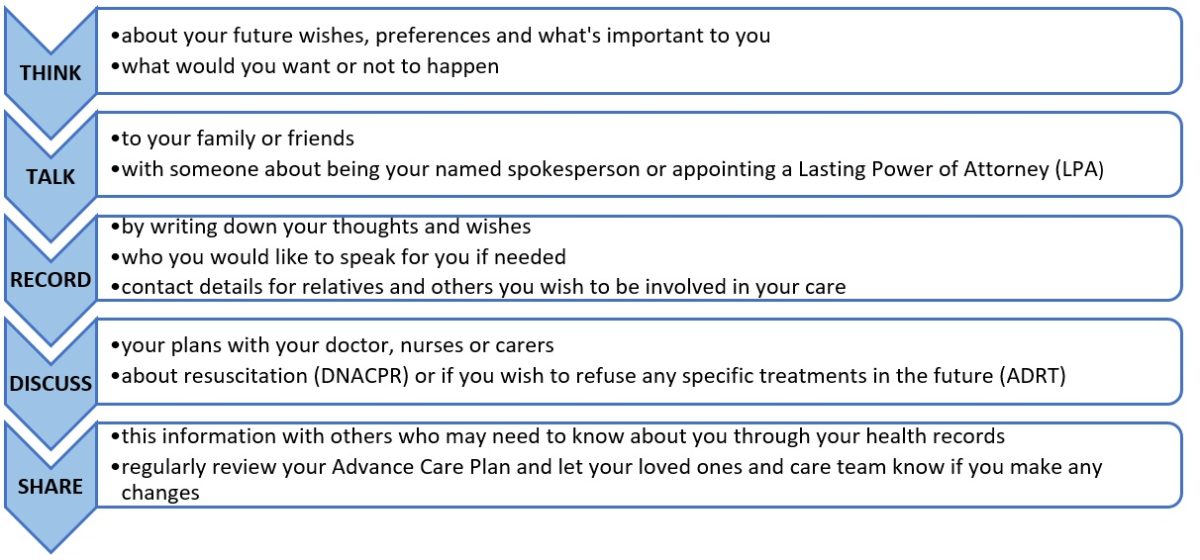Advanced Care Planning and Support
Have you planned for your future care? We all need an Advance Care Plan.
Thinking ahead, discussing with others and writing things down means that your wishes are known and respected, and you’re more likely to receive the kind of care you want in the place you choose if you become unwell, or if you could no longer speak for yourself.
An Advance Care Plan sets out how you wish to be cared for should you be unable to make decisions at the time you need care. Your Care Plan shows how you want to be looked after and what treatments you want or don’t want in the case of serious illness.
What is an Advanced Care Plan?
An Advance Care Plan is a short document registered with your GP practice that states your wishes for future care should you become incapacitated through illness or accident. The care plan is then made available to all professional who might deal with you in such a situation – Doctors, paramedics, community nurses, carers – so that everyone understands your wishes.
If you have a long-term illness or simply what to plan ahead in case of unforeseen circumstances, this information and link provided will help you set up an Advance Care Plan.
Advance Care Planning is a very simple process in 5 steps, please see the diagram below.

5 Key Elements to think about
You can write down your Personal Care Plan with information about you and your lifestyle, including your thoughts, preferences and wishes, beliefs and values regarding your future care. This is known as an Advance Statement. It is not legally binding but anyone involved with or making decision about your care must take it into account if you were unable to tell them yourself.
There are other decision you may wish to make that you should also include:
• Contact details for relatives and other interested parties – particularly if they are your names spokesperson or representative for a Lasting Power of Attorney.
• You religious preferences including your spiritual adviser
• Whether you have a Will and where it is held.
• Decision about organ and tissue donation.
• Decisions you have made about your funeral.
• Any other important wishes.
http://advancecareplan.org.uk
http://compassionindying.org.uk/library/planning-ahead-treatment-care/
The Advance Care Decision to Refuse Treatment (ADRT) is a legally binding written decision outlining any decision you make to refuse specific treatment. In and ADRT you can:
• Say which treatments you don’t want to receive if that time comes.
• Say in what circumstances you would refuse treatment.
• Refuse treatment that could potentially keep you alive (such as a ventilator)
You cannot use an ADRT to request and end of life.
If you want to make an ADRT, you must discuss it with your health professional so that your wishes are properly recorded and legally binding on doctors and nurses that might treat you in the future.
http://www.gov.uk/guidance/short-term-options-for-health-welfare-and-financial-decisions
Cardiopulmonary resuscitation (CPR) is a treatment that aims to start breathing and blood flow in people who have stopped breathing or whose heart has stopped beating. In your Care Plan you can make it clear any circumstances in which you would wish to refuse CPR.
This is called a ‘do not attempt cardiopulmonary resuscitation (DNACPR) decision’.
You can also use your Care Plan to identify how you would like to be treated if there is a medical emergency such as a stroke, or accident, and you are unable to express choices. Like an ADRT, this should be made in discussion with your doctor or a health professional you trust and who knows your medical history.
A Spokesperson is someone you ask to speak on your behalf if you are unable to do so yourself. The should be someone who knows and understands your preferences and wishes. This is not a legally binding position, they can advise but not make decisions about your care.
The Lasting Power of Attorney (LPA) is a legal document which authorises someone else (Often a relative or relatives) to make decisions on your behalf should you become unable to.
• An LPA for health and welfare gives someone else the right to make decisions about your healthcare and other aspects of your welfare. For example, decisions about medical treatment or moving into a care home. It also allows them to access your health records.
• An LPA for financial matters or property and financial affairs allows someone to make decisions about your money and property for you. For example, managing your bank account.
The law on Lasting Power of Attorney differs slightly between England and Wales, Scotland, and Northern Ireland.
http://www.gov.uk/power-of-attorney
What to do now
Have a think and have a chat with those close to you. Write down the things that would matter to you if you became seriously unwell or unable to speak for yourself.
Speak to your GP or health professional who knows your medical history about things you may or may not want to happen.
You can change your Advance Care Plan anytime and should be reviewed with you every year to ensure it reflects your wishes.
This is your plan. Please keep a copy in your home.
Useful Information
Access useful documents and information below – available to view, print, or download.
Advance Decision to Refuse Treatment (ADRT)
Understanding Advance Care Planning and the options open to you

